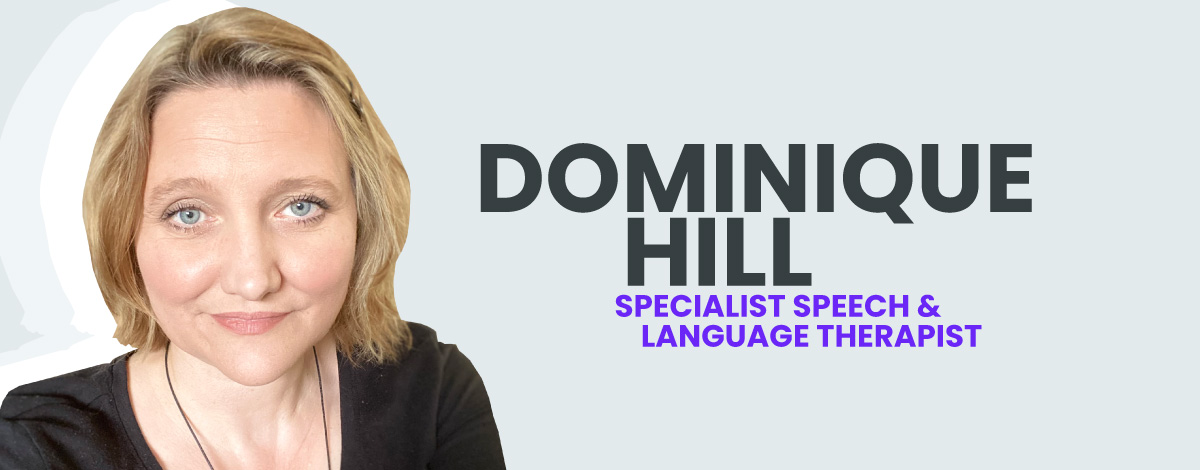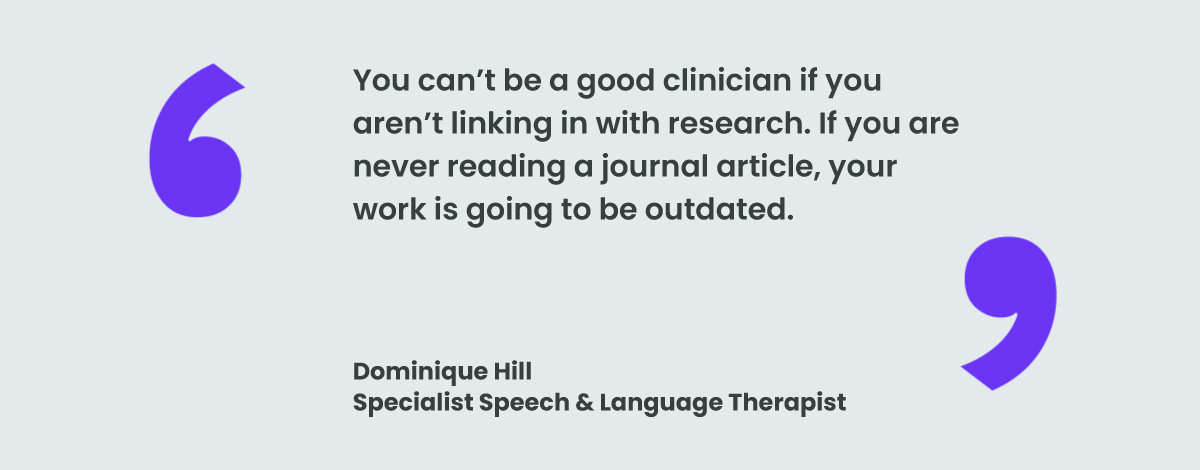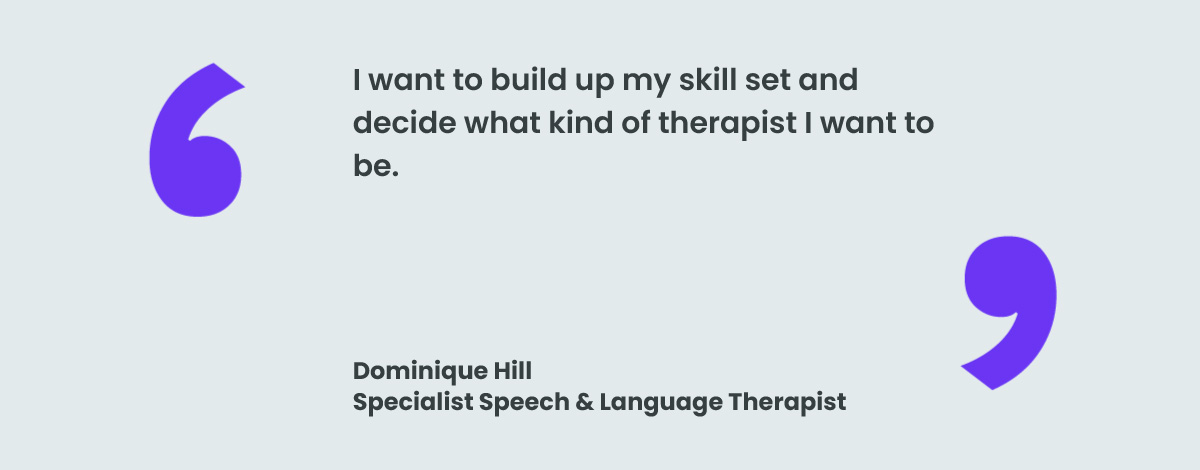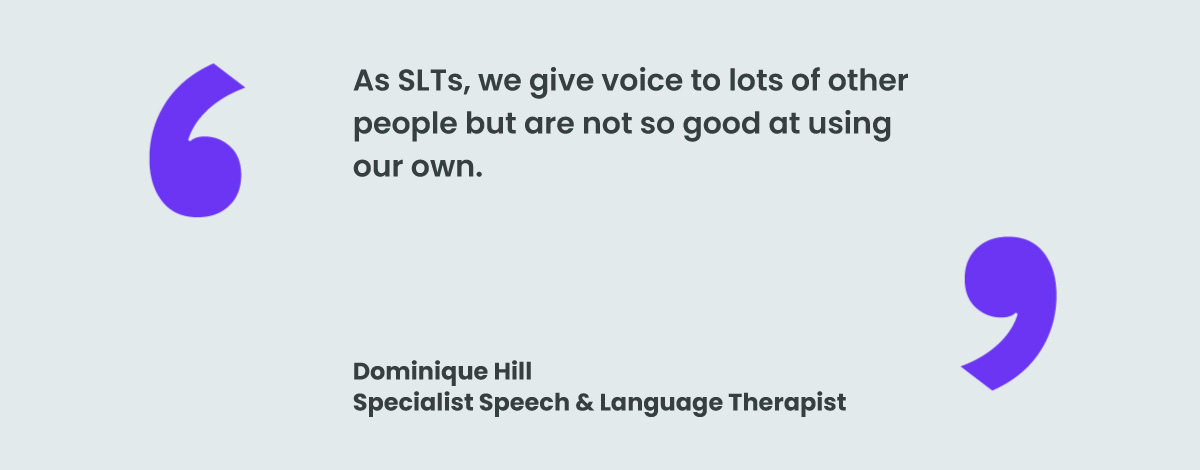Reflections with Julia: 'Giving a voice to people and becoming an advocate for them is a real privilege’
10 Aug 2021Interview
In this interview, we speak to Dominique Hill, a Specialist Speech and Language Therapist at the Cumbria, Northumberland, Tyne and Wear NHS Foundation Trust.
Dominique has been working in the community for a Specialist Children and Young People’s Service but is about to start a new role working with adults with autism in an inpatient setting. She shares her journey to becoming an SLT and reflects on her experiences and CPD practices.

Julia: Firstly, it would be great to learn a little more about you! When did you first become an SLT and what drove you to pursue the career?
Dominique: “Historically, I’d done every job in the Yellow Pages. In 2008, when my children were young, I decided I wanted a better work-life balance, so I got a job in a local school as a teaching assistant. I found myself doing very specialist work in that role, which I was lacking experience in. Anyone with communication difficulties was sent my way for extra support. The local communications support service would work with a particular pupil, but would ask me to observe and then carry it on.
“This organisation was offering level 3 training in ‘Spoken Language and Communication Difficulties in Children’, so I decided to complete that, which led me to want to do more. As I only had GCSEs at that point, I asked the university what qualifications I would need to progress onto their programme. I then went to night school for two years to achieve what I needed to get into uni.
“So once I had taken the first step, I wanted to carry on - I was in it for the long haul. Uni was full-time, Monday to Friday, 9-5, plus placements. It was a big decision and we had to survive on one salary for those four years. I was the oldest on the course, with the other ‘mature student’ being only 22! But I think my life experience and all the different jobs I’d had really helped me and has meant I am comfortable talking to lots of different people.
“I wasn’t career-minded until I started working as a TA. I am now really passionate about my job, which sounds cliché, but I genuinely love it. I love the challenge.
“Giving a voice to people and becoming an advocate for them is a real privilege.”
Tell us a little bit more about your current role working with young people, and the new one you will be starting soon.
“At the moment, I work in a Positive Behaviour Support team with young people displaying behaviours seen to be challenging. We are a small, multidisciplinary team of about 23, made up of nurses, psychologists, a psychiatrist, an occupational therapist and an SLT - me. We work collaboratively devising strategies for a Positive Behaviour Support plan.
“To do this, we visit all the stakeholders in a child’s life - anywhere that child goes, we go. We work with them in school, respite, clubs, with parents, and with any existing community teams that work with the child. I prefer to say that our little team is interdisciplinary, and the multidisciplinary team includes everyone else - all of the stakeholders who know the child best.
“We work alongside the existing community teams to identify what the child’s behavioural triggers are and what strategies can be put in place. We follow a 12-week pathway. Although we are experts in our profession, the real experts are those who know the child best and have known them for years.
“In my new role, we follow a Positive Behaviour Support pathway, but with inpatients. In this setting, the patients also have creative therapy, music therapy, and art therapy alongside the standard multidisciplinary team.
“The adults are in hospital as they have very complex needs. Some can’t be managed safely in the community due to risk. But we keep them in the hospital for as short a time as possible and they should have a discharge plan in place from the beginning.”

Can you reflect briefly on your experience as an SLT during the pandemic? As your role was community-based, what has been the impact on your ability to support children and young people?
“We kept the same caseload during the pandemic. If we couldn’t meet face-to-face, we had to find ways around it. We had to do more over the phone or on Teams. I could still do all of my information-gathering, and all of our internal meetings would be on Teams. It was actually great, as we could get more people together than usual. It was hard to carry out observations from a distance, but most schools let us in.
“For formal assessments with a child, we did what we could, but had to be careful with the material we used. We made videos for children and parents, for example using Makaton. We were surprised about what we could do.
“In some cases, we ended up having live streams of what was going on in people’s homes. This was very insightful, as we are often less likely to get a true reflection of what is going on with the child’s behaviour when we are there in person.
“So there have been some good things to come out of the changes we have had to make due to the pandemic.”
I have seen on your Twitter account that you have been doing some campaigning around funding improved support for people with communication and swallowing needs. Could you tell me more about the changes that you and others in your profession would like to see?
“I can only speak for myself. I would like to see extra funding available for all ages, but I think there is a huge gap in early intervention and prevention.
“SLTs working in schools need opportunities to work in a holistic way. Working on speech alone is not always enough. If the children I work with had received some intervention and prevention work, we might have caught them earlier. Many have already started to develop mental health difficulties. They are at risk of isolation. Often their long term prospects for educational achievement and employment are poor.
“Sometimes when children communicate through behaviours, it’s because they don’t have functional communication skills. If skills were taught earlier, the child’s frustrations would not reach the levels they end up at.
“In the old days, if you were disruptive at school, you were sent out of the classroom. You could get in trouble for fidgeting. But for an autistic child, for example, that fidgeting could be a coping strategy. It’s about making the communication environment a capable environment. Is this person challenging, or is it the environment that is more challenging to them, causing them to display certain behaviours? Let’s make the environments, including the people, suitable for the child. We need to look at what adaptations we can make.
“A lot of schools we go into are now receiving Positive Behaviour Support training, so the message is slowly getting through. We are trying to educate people about the functions of someone’s behaviour: are they trying to get your attention, attempting to escape/avoid a situation, needing sensory stimulation, or do they want to access a particular item/activity?
“Many schools have their own sets of rules, with consequences, whereas we don’t believe in punishment. We want to know why a child is doing something and how we can help to prevent it in the future. Prevention is better than punishment.
“We strive to be person-centred, giving flexibility, choice, and opportunities where possible. It’s also about the people within the environment and how they can support the person - so if you use Makaton as your communication method of choice, we need to make sure carers are also trained in using Makaton.”

Ok, let’s talk CPD! How do you keep a log of all the different CPD-type activities you carry out?
“I tend to use my Outlook calendar - I colour-code all CPD in yellow, and then I write it all down. Once a month, I type up all the CPD I have done as part of my supervision preparation. It helps me to keep the momentum going.”
What are your favourite CPD activities and resources?
“I enjoy working with student SLTs; supervising them, speaking to them at uni, and being an external examiner (as I can grade things from a holistic, real-life perspective). I also take part in ‘speed dating’ type events where students can come and speak to different SLTs.
“I love doing CPD where you listen to the experiences of service users. It really gets you thinking about how you can make changes to your practice. I attended a CPD session recently that was so moving - a man shared his experience of only just being diagnosed with a learning disability at 44 years of age.
“I sit on a steering group for CPD, which started off as a ‘Writing for Publication' workshop. I wrote a ‘Day in the Life’ article for Bulletin magazine as a result of attending that. Its remit has now expanded to a wider CPD focus and we meet once a month. Any AHPs from our trust can attend and we always have a guest speaker.
“I have also joined the Royal College’s Clinical Excellence Networks (CENs), where we meet people at all stages of their career journey, listen to their experiences, and discover opportunities to help your development and practice. They are groups of like-minded people wanting to develop similar skills.
“I’m a member of the Positive Behaviour Support CEN, as well as one for Applied Behaviour Analysis. Some of these groups charge an annual fee, but some are free.
“I’m always doing something. My trust has always been very supportive of training. Generally, if I ask for training and they initially say no, I keep fighting until I get it! If you are asking for training just to get a piece of paper, that isn’t going to work. If you want to go on a course, you need to think about what you are really going to do with it: can you teach it to others? Can you apply it to your service users?
“I have a nice mix of CPD. I just completed an online Talking Mats course. I couldn’t ask the trust to fund it, as they are already funding me to become a Makaton tutor, but I applied to the Royal College who have grants available and they said yes.”
How do you find time to access the range of CPD resources out there?
“With the CPD steering group, we are advocating for all AHPs to take half a day for CPD each month - no matter who you are and what band you are in. It’s about providing that space for them to do it. We introduce guest speakers, give the AHPs two hours of writing time, and then they can come back and discuss it with other colleagues. The process allows more collaborative AHP working, rather than just being in separate groups.
“It used to be that these CPD activities were face-to-face. Now it’s virtual, we can record the session, so people can take their half-day slot and watch the content at that time, or attend a live workshop.
“We are in the process of doing an audit on whether people are doing their CPD and what mix of activities they are doing. A survey has gone to all AHPs, and directors are on board and want to know the answers.
“You can’t be a good clinician if you aren’t linking in with research. If you are never reading a journal article, your work is going to be outdated.
“I think it’s great how flexible training providers have been throughout the pandemic.”

What are your hopes and aspirations for your career moving forward?
“My new role will help me make a decision on where I want to be. I want to develop my leadership and management skills and move up into band 7. I want to continue to fight for the rights of people with communication needs, so moving up slightly will put me in a position where I can not only recommend changes to services, but also make them.
What advice would you give to those currently training to become Speech and Language Therapists, in terms of how they can continue to build their professional skill set beyond university and maintain their passion for the profession?
“I would recommend looking for opportunities linked to where you are working. Don’t do something so wildly different that it can’t be applied to your service users - you’ll end up with a certificate and not much else.
“For example, a few years ago I did a graduate certificate in working with chronic trauma, and another in Child and Adolescent Mental Health, because I was working in an inpatient setting that also had psychiatric intensive care facilities. I built up my knowledge and skills in mental health issues so I could support young people better in my role.
“To those just qualifying, I would say - be the change. Find your tribe and don’t bend who you are. Hang on to your values base, as there will be like-minded others out there.
“As SLTs, we give voice to lots of other people but are not so good at using our own.
“You can’t change it all, and there will be things you disagree with. But if you can go home, look in the mirror and say ‘I have done everything I could’, then that is enough.
“If you are working with vulnerable people, you need to be the person that cares. You are working with people’s lives and it is a big responsibility.
“As an AHP, you carry stories with you. You ruminate on a lot of your experiences and the people you are helping.
“We see people at their worst or lowest - that, for me, is a privilege.”
A huge thank you to Dominique for taking the time to reflect with us on her experiences. If you enjoyed this article and found it a valuable insight into the life of an SLT, please share it on Twitter.
Julia helps you record, reflect, and report on your CPD through our website and app.
It's an easy way for you to stay on top of your CPD. Sign up for a 14 day free today.